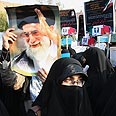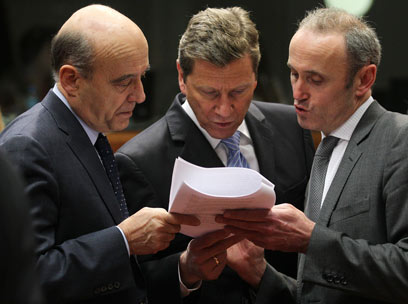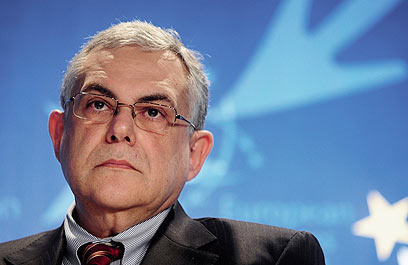
EU tightens Iran sanctions; mulls oil ban
At meeting in Brussels, EU foreign ministers decide new sanctions against Tehran should be drawn up in time for next meeting in January; could lead to gradual cuts in Europe's imports of Iranian crude
At a meeting in Brussels, EU foreign ministers decided new sanctions should be drawn up in time for their next meeting in January. That could lead to gradual cuts in Europe's imports of Iranian crude.
Related stories:
- Iran releases students who stormed British Embassy
- UK to call for tougher Iran sanctions 'We'll give up nukes if Iran does same'
Separately, they added 180 Iranian people and entities to a sanctions blacklist that imposes asset freezes and travel bans on those involved in the nuclear program which Tehran says is for peaceful purposes.

EU Ministers mull sanctions (Photo: AP)
Concern over Iran's program grew this month after the International Atomic Energy Agency issued a report that suggested Iran has worked on designing an atom bomb.
French Foreign Minister Alain Juppe said after meeting his counterparts in Brussels that the EU would work with its partners to offset any shortfall if an oil embargo were imposed.
Overcoming resistance
"We are working on it," he told reporters when asked about the possibility of an oil ban. "We have to work with different partners so that the interruption of (oil) deliveries from Iran could be compensated by a rise in production in other countries."
France, which has pushed for oil sanctions, appears to have overcome resistance among some EU member states who had expressed concerns over economic costs of an oil embargo.
Experts say global crude prices could rise if the EU bans Iranian oil, which could bring additional economic pain as Europe struggles with a debt crisis and the specter of recession.
Greece, in particular, had been reticent, because financial woes have led it to buy more Iranian crude. Sources say Tehran has been offering better financing terms at a time when banks are reluctant to extend loans to Athens.
"Greece has voiced some concerns, we have to take them into account," Juppe said.

Greek PM: Voiced concerns (Photo: Reuters)
Britain, along with France, had pushed for decisive EU action after Tuesday's storming of British diplomatic compounds in Tehran by protesters angry over London's decision this month to impose sanctions on the Iranian banking sector.
Squeeze nuclear program
"I hope we will agree today additional measures that will be an intensification of the economic pressure on Iran, peaceful legitimate economic pressure, particularly to increase the isolation of the Iranian financial sector," Foreign Secretary William Hague told reporters ahead of Thursday's meeting.
Britain shut Iran's embassy in London and expelled its staff on Wednesday, saying the storming of the British mission in Tehran could not have taken place without consent from Iranian authorities.
Hague denied a link between the embassy storming and Thursday's meeting in Brussels.
"I stress that the measures I hope we will agree today are related to the Iranian nuclear program. These are not measures in reaction to what has happened to our embassy," he told BBC radio.
Ministers said in addition to the oil sector, Iran's transport and finance industries could be targeted.
"The Council agreed to broaden existing sanctions by examining, in close coordination with international partners, additional measures including measures aimed at severely affecting the Iranian financial system, in the transport sector, in the energy sector," they said.
Swedish Foreign Minister Carl Bildt said he was prepared to agree to a crude oil embargo, but questioned the effectiveness of such a measure.
"I am prepared to go along with that," he told reporters. "I don't think it will necessarily have that much of an effect because of the nature of the global oil market."
German Foreign Minister Guido Westerwelle said there were still connections between Iran and Europe that needed to be cut off in order to squeeze the nuclear program financially.
"We cannot accept an option of nuclear armament of Iran," he said. However, he added that sanctions in the financial sector would have to take account of "the population of Iran that is not responsible for the politics there".
- Receive Ynetnews updates directly to your desktop










